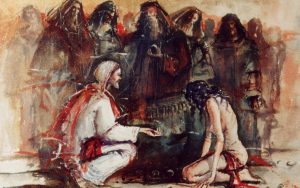What is it worth?
Travel anywhere around the globe and you will discover one irreducible, ineluctable fact, which is: virtually anything can be obtained in some form or fashion for a price. Almost everything you might possibly desire (good or bad) can be bought if you have something of sufficient value to pay for it. But for any transaction to occur there must first be a price established which requires a valuation to be made, which is for most people a dark art involving voodoo magic along with intricate and complex financial methods and processes. At its core, valuation is simply deciding what a thing is worth, its value, the price which others should be willing to pay.

The First Stone
Of course the essential question is who decides what a thing is worth? This question is, for the most part and in almost every case, unanswerable. In today’s technological environment the price is generally established using some formulaic computer model which considers all the factors with callous indifference and spews out prices for thousands if not millions of things. But no matter how the valuation is accomplished it is based on actual purchasing behaviors, transactional history, and an understanding of human needs and desires.
So who decides what a human life is worth? What price for your life, a member of your family, a friend, an enemy, a stranger, a fetus in the womb, someone with Alzheimer’s, the young, the old, those with mental or physical disabilities, psychopaths, sociopaths, bigots, terrorists, murderers, geniuses, morons, givers, takers, lovers, haters, saints, sinners, rich, poor, good, or bad? Who decides whether you are essential or nonessential, important or unimportant, of great value or worthless refuse? Those who believe it not only right but their right to place value upon others ought to be reminded that Jesus said, “Let the one among you who is without sin be the first to throw a stone at her.”[1]
History is replete with those who would play god, looking at all others as mere tools to be used, abused, and heartlessly discarded when no longer of use. Millions upon millions of nameless and forgotten souls have perished but for the whim and dictate of those who believe only in their power to rid themselves of those who were perceived to be of no consequence or value. Under Stalin it has been estimated that more than 20 million people were killed while more than 12 million people were killed by the Nazis under Hitler. While these numbers are staggering and hard to fathom in their abhorrent numbers, they are far fewer than the 50 million unborn infants murdered in the U.S. alone since abortion was legalized in 1973.
The horrifying reality is that when it is man who decides another man’s value, that value too soon dissipates, reduced to no value when perceived as a threat, a nuisance, or an inconvenience. Those whose argument is that it is their right to choose, that it is theirs to decide over the life or death of another have neither such a right nor any legitimate claim to such power. In the matter of human lives there is not one scintilla of difference between those who would kill millions and those who would kill one.
[1] Jn 8:7.
